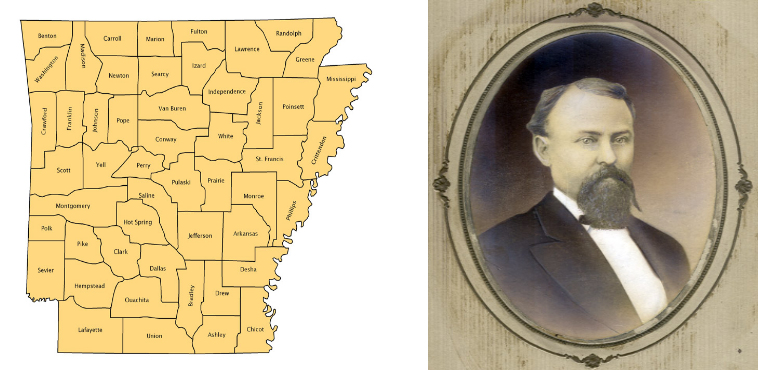By Dr. Curtis Varnell
Politics has always been viewed as kind of a rough and tumble affair and nowhere was it more evident than in the formation of the counties that make up Arkansas. When the Territory of Arkansas was formed, there were an original five counties. As the population grew, these large geographical counties were divided into smaller and smaller units until we ended with the seventy-five counties we have today.
Johnson county was formed in 1833 with about one-third of its territory lying south of the Arkansas river. A temporary county seat was established at the river port of Spadra with a group of three commissioners appointed to establish a permanent site. Those three were Abraham Laster who lived north of present day Clarksville, Bettis Alston of Spadra, and Lorenzo Clarke, a prominent businessman of Morrison Bluff. Each of the three wanted the courthouse as close as possible to their home, thus the first stalemate in the negotiations. After a great amount of maneuvering, Clarke realized that Morrison Bluff held the least amount of cards. Negotiating with the opposition, he agreed to allow the county seat to be placed on land donated by Josiah Cravens as long as it was named Clarksville. Out-voted, Spadra was left out in the cold.
After the Civil War, politics changed in Arkansas. Radical Republicans, many of them deemed carpetbaggers by the locals, controlled the state government. Sixteen new counties were formed in Arkansas from 1868-1875. Spadra had stewed over being excluded as the site for the county seat and began an appeal to have the courthouse moved to their more central location on the riverfront. Fearing the people on the south side of the river would side with Spadra, a group of ex-confederates put together $1,000 and approached the state senator John Sarber. Sarber was an enigma, a former union soldier turned carpetbagger who had married Susan Rose, a daughter of prominent former confederates. After the war, he quickly moved up the political ladder and was a favorite of Arkansas governor Powell Clayton.
Sarber was well aware of the divisions and interests that existed in the area he represented. Working with ex-union soldiers from south of the river, he introduced legislation to create a new county. Pieces of Scott, Yell, and Franklin County would also be required to establish a large enough territory and population to entitle the area a county. Knowing local politics, he enticed Franklin County to agree with him by offering up the port-city of Roseville, a rival of Ozark, to be included in the new county. By hook or crook, the other counties were brought into agreement. The Booneville area was once the county seat of Scott County. During the Civil War, many of the local farmers had joined the confederacy and were solidly democrats. As former Confederates, they were not allowed to vote. Punishment by the legislature was to separate them from Scott County and allow the three appointed county commissioners, all radical republicans, to select the new county seat.
The new county, named Sarber, was established exactly 150 years ago. The county seat was first at Revilee, a site described by the Gazette as “ten miles from nowhere.” It was later moved to Ellsworth, a site so aggravating to the former Confederates from Booneville that they organized a posse estimated at two hundred men to “investigate” the site. During the investigation, the newly established courthouse was burned. To avoid further trouble, a new town, Paris was established and became the county seat.
Establishment of the new county brought about charges of corruption, deception, and even murder when James Bethel, opposed to the establishment of the new county, was supposedly murdered while traveling to Little Rock carrying petitions opposed to the county’s creation.
In 1874, former Confederates once again were able to vote. Immediately, the county moved to change the name of the county from Sarber to Logan; named for a prominent pioneer and former slave-owner of Sugar Grove. And now, as Paul Harvey always said, we know the rest of the story!!






